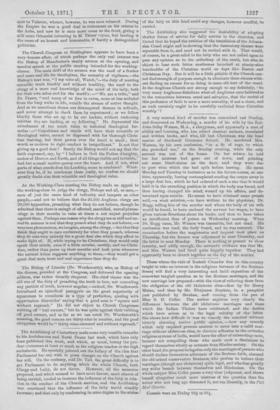The Church Congress at Nottingham appears to have been a
very demure affair, of which perhaps the only real interest was the Bishop of Manchester's manly sermon at the opening, and manlier speech at the public meeting intended for the working-
• classes. The main drift of the sermon was the need of a fresher and more real life for theologians, the necessity of vigilance, —the Bishop's text was, "I say unto all, Watch,"—the duty of meeting scientific truth frankly and without hostility, the need to the clergy of a more real knowledge of the mind of the laity, both for their own sakes and for the world's :—" We are a tribe," said Dr. Fraser, " and many of us live in caves, more or less secluded tfrom the busy walks in life, outside the stream of active thought. And so we sometimes dream our distempered dreams in solitude, and never attempt to check them by experiment ; or wo follow -blindly those who set up to be our leaders, without reckoning whither they are leading, or we following." Ile deprecated the attachment of too much value to technical theological for- mulas :—" Catechisms and creeds will have their scientific or theological value, cannot be dispensed with for thorough Chris- tian training, but their power over the heart is small ; their worth as motives to right conduct is insignificant." Is not that giving up a good deal ? Surely the Bishop would not say that the faith expressed, say, by " I believe in God the Father Almighty, maker of Heaven and Earth, and of all things visible and invisible," had but a small motive-power over the heart. And if not, what parts of what creeds does his Lordship mean to condemn? What- ever they be, if he condemns them justly, we confess we should greatly doubt also their scientific and theological value.


































 Previous page
Previous page